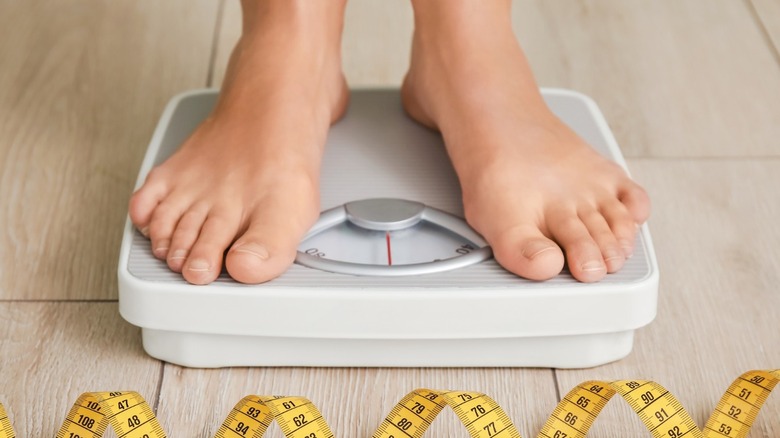14 Simple Ways To Maintain Your Weight Loss
After putting in the work to drop those extra pounds, maintaining your weight loss can be more difficult than expected. Research published in The American Journal of Clinical Nutrition showed that only about 20% of people who were overweight and lost at least 10% of their body weight were able to maintain that weight loss for one year. Another study in The New England Journal of Medicine echoed the same results, stating that very few people are able to sustain weight loss after successfully dropping the initial weight.
However, determining the reasons why it's so challenging to keep the weight off can help people develop a strategic plan to maintain their hard-fought weight loss. An article published in Diabetes Spectrum shares that many people struggle with weight loss maintenance due to a combination of causes, including genetics, hormones, metabolism, and neural factors.
While weight loss maintenance can be hard, it's not impossible. In fact, research shows that it actually gets easier over time, with those who are able to maintain weight loss for two to five years having an increased chance of long-term success (per The American Journal of Clinical Nutrition). The key is committing to sustainable life changes that keep you from returning to old habits. If you're struggling to keep the pounds off after reaching your ideal weight, here are 14 simple ways to maintain your weight loss.
Get the right amount of exercise
Physical activity plays an essential role in maintaining weight loss. A review shared by the National Library of Medicine found that an exercise program that includes more than 250 minutes of physical activity per week in combination with restricted calorie intake was proven to help maintain weight loss in overweight and obese patients.
The Centers for Disease Control and Prevention (CDC) also notes that decreased caloric intake is necessary to lose weight. However, regular physical activity is the only way to maintain that weight loss (via CDC). The CDC goes on to share that exercise increases calorie burn, which creates a calorie deficit if you reduce the number of calories you consume at the same time.
Although exercise helps burn calories, another article in Obesity Reviews warns that the energy deficiency created by exercise can impact appetite, making it difficult to control hunger. For this reason, physical activity and a balanced, low-calorie diet should go hand in hand if you want to successfully maintain your weight loss (per the National Library of Medicine).
Some easy ways to add more physical activity to your daily routine include parking further away from your destination to increase your steps, choosing to take the stairs rather than the elevator or escalator, and taking scheduled breaks at work for a quick walk around the office. Also, talk to your doctor about exercise routines that are appropriate for your age and activity level.
Add more protein to your diet
Adding more protein-rich foods to your diet is another lifestyle change that can help with weight loss management. An article in The American Journal of Clinical Nutrition shares that protein can increase satiety, or the feeling of fullness, by affecting hormones that help regulate weight and appetite. When you feel full, you're less likely to indulge in overeating and regain the weight. A study found when people consumed protein as 30% of their calories, they reduced their overall intake by 441 calories per day.
Research in The American Journal of Clinical Nutrition also shows that a higher protein diet can help with retaining lean muscle, which a study published in Adipocyte noted can increase metabolism.
According to research published in Clinical Nutrition and Metabolic Care, protein also helps the body burn more calories due to increased dietary thermogenesis. This high thermal effect of protein boosts metabolism while also helping with satiety. The result is the body burning more calories versus a diet lower in protein consumption (per Healthline).
Keep track of your progress
When it comes to managing your weight loss, keeping records of your progress (and setbacks) may be helpful. According to a study in The Journal of the Academy of Nutrition and Dietetics, people who weighed themselves every day lost significantly more weight than those who weighed themselves less.
The study results also showed that the people who weighed themselves daily adopted more positive behaviors that helped them control their weight. Other research confirmed that those who self-weighed consumed fewer calories per day when compared to the control group.
However, tracking progress isn't limited to daily weigh-ins. Increased monitoring of physical activity levels can help people follow their exercise programs and maintain weight loss (per the National Library of Medicine). Also, keeping a food diary can help change eating behaviors and help with weight loss management, according to Harvard Health Publishing.
If you're hoping to improve your chances of maintaining your weight loss, it's time to start tracking! Try to weigh yourself daily, log your physical activity, and keep food records to stay motivated and consistent.
Add weightlifting to your routine
It's not uncommon for people who lose weight to also lose muscle mass (per the International Journal of Obesity). Unfortunately, reduced muscle mass also means a slower metabolism and not as many calories burned during the day, according to the Cleveland Clinic. To help counter these effects, lifting weights to build more muscle may be helpful in maintaining weight loss.
A review published in American College of Sports Medicine showed that weight resistance training does not necessarily improve weight loss, but it can help increase and maintain muscle mass. Another article shared research confirming that people who lifted weights were more successful at maintaining weight loss than those who didn't (via the International Journal of Behavioral Nutrition and Physical Activity).
Before you start with a weightlifting regimen, it's important to speak with your doctor to see if resistance training is a safe option for you. Some types of resistance training include lifting weights and strength training using your own body weight as resistance.
Eat breakfast
While eating might seem counterintuitive to losing weight and maintaining weight loss, consuming a healthy breakfast every day can actually have positive effects on your weight.
A study in the Journal of the Academy of Nutrition and Dietetics showed that those who ate breakfasts containing fiber, vitamins, calcium, and other essential nutrients had lower body mass indexes (BMIs) compared to those who skipped breakfast. Another article published by The American Journal of Clinical Nutrition confirmed that people who ate breakfast regularly had more success with maintaining weight loss.
Also, research shows that eating breakfast seems to impact a person's other weight-related behaviors, including exercising and consuming more nutrient-dense foods. The results show that those who ate breakfast consumed more calories, but were actually less likely to be overweight.
However, it's crucial that you consume a balanced breakfast rich in nutrients for this strategy to be effective (per the Journal of the Academy of Nutrition and Dietetics). Overindulging in breakfast foods with added sugars can have a negative effect on managing your weight loss, so it's best to avoid options that have sugar added to them for flavor (via Dietary Guidelines for Americans).
Limit refined carbohydrates
Although carbs tend to have a negative reputation in the weight loss world, not all carbs are bad for you (via Men's Health). The carbs found in whole foods actually contain nutrients that support a healthy lifestyle (via Healthline). However, refined carbs are carbohydrates with most of the fiber and nutrients removed. These are the carbs that are linked to obesity and other health issues.
Refined carbs are generally high on the glycemic index, which means the body digests them very quickly. This also leads to spikes in blood sugar and increased hunger soon after consuming refined carbs, which can cause overeating and weight gain (per the Mayo Clinic). Conversely, consuming foods low on the glycemic index prolongs satiety, reduces caloric intake, and can help with long-term weight loss, according to research in the American Academy of Pediatrics.
Also, a review in Nutrition, Metabolism & Cardiovascular Diseases found that diets lower in carbohydrates and higher in protein may help with weight loss and long-term weight maintenance. These results indicate a low-carb, high-protein dietary approach to weight loss management can be beneficial for many people.
To cut your refined carb intake, avoid white flour and bread, white rice, pasta, sodas, candy, pastries, sugary cereals, and other highly processed foods. Instead, go for whole foods high in fiber.
Drink more water
With quite a few health benefits to drinking more water, it's always a good idea to stay hydrated. However, a lesser-known advantage is weight loss support. Research has shown that drinking water before meals may actually help with reducing calorie intake, which can ultimately help with weight loss maintenance (via the Journal of the Academy of Nutrition and Dietetics). In fact, the study resulted in 13% fewer calories consumed by those who drank water before their meals versus those who did not drink water.
Also, a study on water consumption and weight published in The Journal of Clinical Endocrinology & Metabolism found that drinking 500 milliliters of water increased the subjects' metabolic rates by 30%. This increase was short-term, with the body reaching the maximum metabolic rate between 30 and 40 minutes after ingesting the water. However, the study also showed that increasing water consumption to 1.5 liters would boost daily calorie burn over the course of a year.
Some ways you can increase your daily water intake include setting reminders or alarms for yourself, keeping a reusable water bottle with you, replacing other drinks with water, and drinking a glass of water before each meal.
Try meal planning
Planning your meals ahead of time gives you more control over the types of foods you eat and portion size, which can help you stay on track with your weight loss maintenance. According to the CDC, meal planning ensures that you have healthy options available when you get hungry and are tempted to hit the drive-thru.
Research published in the International Journal of Behavioral Nutrition and Physical Activity showed that meal planning was linked to healthier diets and reduced obesity levels. Study results confirmed that people who planned their meals got a higher level of food variety and lowered their risk of being overweight.
There are several resources that can help you plan your meals with grocery lists, recipes, and calorie counts available. For example, you can use the MyPlate Plan provided by the U.S. Department of Agriculture (USDA) to enter your age, sex, height, weight, and physical activity level and get your recommended calorie intake and target amounts for each food group. The results can help you put together healthy meal ideas based on a healthy diet for your needs.
Get enough sleep
A review in Obesity found a connection between short sleep durations and both current obesity and future obesity. It seems that not getting enough sleep can have detrimental effects on your weight now, as well as in the future. Also, the obesity epidemic has increased at the same pace as chronic sleep deprivation, suggesting that sleep deprivation may affect weight gain, appetite, physical activity levels, and thermoregulation (via Obesity).
Studies on sleep duration and the risk of obesity showed that restricted sleep is linked to increases in ghrelin, a hunger-promoting hormone, and decreases in leptin, the hormone that affects satiety (per Clinical Nutrition and Metabolic Care). These hormonal levels can increase hunger and lead to overeating, which may have negative effects on weight loss maintenance.
The research also shares a link between sleep deprivation fatigue and an increasingly sedentary lifestyle. Lowered physical activity and exercise levels affect the body's energy balance and calorie burn (via Clinical Nutrition and Metabolic Care).
As recommended by the Sleep Research Society, it's important for adults to get at least seven hours of sleep per night on a regular basis. Sleeping less than the recommended amount of time can create unhealthy conditions that promote weight gain and obesity. If you're having trouble sleeping, talk to your healthcare provider about ways to improve the duration and quality of your sleep.
Keep stress levels in check
You may have heard the term "stress eating" used to describe increased hunger levels while going through stressful situations — but is this accurate? Do people tend to eat more when they feel stressed?
A review by Minerva Endocrinol does show some connections between stress and eating behaviors. For one, stress contributes to the development of addictions. Unfortunately, foods high in fat and sugar can become addicting to some people, contributing to calorie intake and weight gain. When addicted to fatty or sugary foods, reducing the consumption of these foods often causes unpleasant physical and psychological effects, including cravings, bad moods, and fatigue, according to an article in Diabetes Spectrum. Neural dopamine signals a need for reward from food consumption, which can quickly lead to overeating.
If you're trying to maintain your weight loss, stress can quickly derail your goals. Fortunately, there are easy ways to reduce stress, including physical activity, meditation, minimizing screen time, reducing caffeine, and practicing self-care (per Healthline).
Cut the sugary beverages
With so many drinks marketed as being "healthy," it's hard to know which ones are actually good for you. Unfortunately, some of these drinks that claim to provide improved energy levels or better hydration are packed with added sugar (per State of Childhood Obesity).
An article in The American Journal of Clinical Nutrition reviews the dangers of consuming sugar-sweetened beverages and the effects they have on weight gain. The studies involving adults found a significant increase in the likelihood of being overweight or obese in subjects who drank more than one soda per week versus those who drank less than that. In men over 50 years old, 77% of soda drinkers had a higher probability of being overweight compared to 58% who drank less than one soda per week.
Sugar is also high on the glycemic index, which means it can increase blood sugar and insulin levels quickly. This spike eventually leads to blood sugar crashes and increased hunger levels that make it hard to keep your diet on track (via the Mayo Clinic).
If you regularly partake in sodas or other sugary beverages, cutting these drinks will help lower calorie and sugar consumption. One 20-ounce bottle of Coca-Cola has 65 grams of added sugars, which is 130% of the recommended daily value! Instead, reach for water or unsweetened beverages to help you maintain your weight loss.
Avoid distracted eating
With smartphones, televisions, computers, and so many other distractions available around the clock, it's easy to find yourself eating a meal while not paying attention to what or how much you're consuming. However, distracted eating can have negative consequences on your weight management goals.
Study results published in Appetite show that some forms of distraction can affect eating behaviors and the ability to recognize hunger, fullness, and the motivation to eat. Most notably, subjects who were watching television consumed more food than those distracted by driving or in a social setting.
One way to help with distracted eating and possibly overindulging is to practice mindful eating, or eating with purpose while being present in the moment. Research has shown that mindfulness practices are being introduced in health-related interventions for issues like binge eating and other eating behaviors associated with gaining weight (via Obesity). Moreover, improving awareness through mindful eating can help with self-regulation and changing a person's relationship or emotional connection with food.
Have a support system in place
Maintaining weight loss is particularly difficult if you don't have people around you who understand your struggles and support your healthier lifestyle (per the Mayo Clinic). However, the type of support you receive can also make a difference in your weight maintenance journey.
According to research published in the Journal of Behavioral Medicine, people who successfully maintained their weight loss received support in the form of compliments and active participation in the weight loss management plan. On the other hand, those who regained weight after prior weight loss got support through verbal instruction and encouragement. As a result, it appears that positive, active support is more beneficial than instructive support when it comes to managing weight loss.
Involving a partner who is also invested in your goals and practices similar lifestyle habits can improve the likelihood of maintaining your weight loss, according to a study in JAMA Internal Medicine. Talk to your partner or family members about the support you need to keep the weight off. Having them on board can make an impact on your success.
Don't let setbacks derail your overall progress
Weight loss maintenance is rarely straightforward. According to the Mayo Clinic, lapses or setbacks in your journey are normal and to be expected. The key to continuing to make progress is to not let these lapses affect your motivation. Even if you make a mistake by eating the wrong thing or skipping a workout, it doesn't cancel out all your hard work. You can still get back on track and recommit to your goals (per the National Institute of Diabetes and Digestive and Kidney Diseases).
You can also try to avoid setbacks by being proactive when you know there will be temptations. For example, avoid the office kitchen if you know a coworker brought cookies or other sweets. If you're eating out at a restaurant, look up the menu online and decide on a healthier dish before you arrive hungry. You can also say "no" to situations that will put you in a position to make unhealthy choices.















